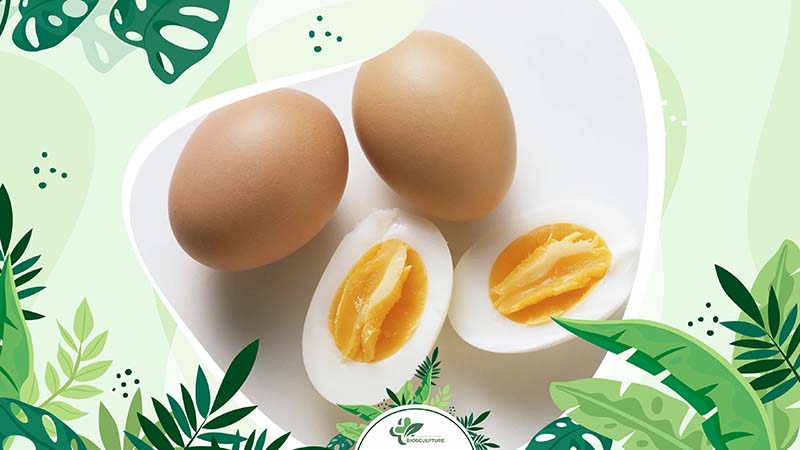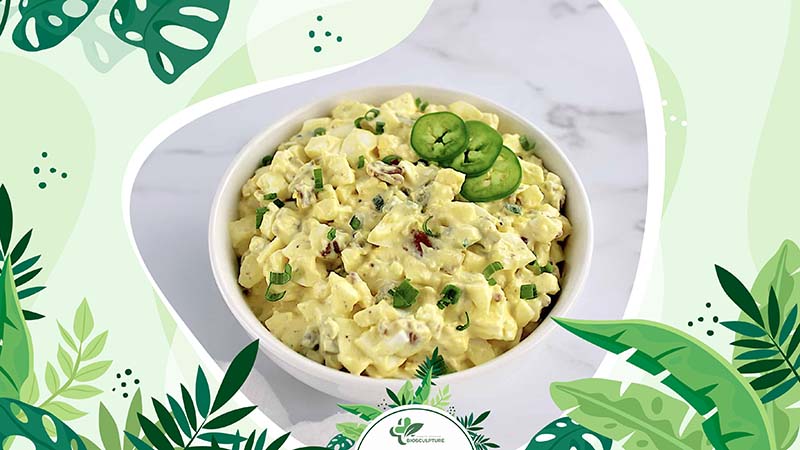Eggs are a remarkably flexible culinary staple, perfect for any meal from breakfast to dinner, and they can be cooked in a myriad of ways to delight your taste buds—be it scrambled, poached, or otherwise. They’re not just a morning favorite; they effortlessly enhance lunches and dinners, finding their place in salads, soups, sandwiches, stir-fries, and beyond.
But beyond their culinary versatility, eggs are a powerhouse of nutrition, offering unique nutrients like vitamin D that are scarce in other foods. Given their widespread use and nutritional benefits, you might be curious about their calorie count and nutritional makeup, particularly if you’re a frequent consumer. This brings up the question, “How many calories are in an egg?” This article from Biosculpture takes a detailed look at the calorie content and nutritional landscape of eggs, providing everything you need to know to intelligently integrate them into your diet.

1. Analyzing the Caloric Content of an Egg
The calorie count in an egg is determined by its size. Naturally, a small egg will have fewer calories than a larger one.
Here’s a quick look at how size affects calorie count, assuming a large egg has 72 calories for every 50 grams:
- Small egg (38 grams): 54 calories
- Medium egg (44 grams): 63 calories
- Large egg (50 grams): 72 calories
- Extra-large egg (56 grams): 80 calories
- Jumbo egg (63 grams): 90 calories
This calorie count is for a plain, whole egg without any added ingredients.

However, when you cook an egg with oil or butter, or pair it with high-calorie sides like bacon, sausage, or cheese, the calorie total goes up. For instance, a large egg fried in 1 tablespoon of butter will jump to about 174 calories. A 3-egg omelet with cheese made in butter can hit around 400 calories, while Eggs Benedict can reach up to 900 calories.
It’s also worth noting that egg yolks and whites have different calorie counts. The yolk of a large egg has 56 calories, while its white part only has 18 calories.
But, choosing food based just on calories might not be the best approach. While egg whites are lower in calories than yolks, it doesn’t mean they’re the healthier choice. Your body needs a certain number of calories each day to work well and keep you feeling energetic.
So, instead of just looking at calories, focus on the nutrient density of foods — how many nutrients you get from a food relative to its calorie content. This way, you’re choosing foods that are not only good for managing weight but also for providing your body with the nutrients it needs to thrive.
2. Nutritional Composition of an Egg
The nutritional value of an egg extends far beyond its calorie count. Indeed, eggs are a remarkably comprehensive source of nutrition, offering a plethora of beneficial nutrients.
Breaking down the nutritional content of a large egg (63 grams):
- Calories: 72
- Protein: 6 grams
- Fat: 5 grams
- Carbs: Less than 1 gram
- Choline: 31% of the Daily Value (DV)
- Selenium: 28% of the DV
- Vitamin B12: 21% of the DV
- Vitamin B2 (riboflavin): 16% of the DV
- Vitamin D: 6% of the DV
- Iron: 5% of the DV

Eggs are a fantastic source of high-quality protein and offer a host of vitamins and minerals. They’re among the few foods that naturally contain vitamin D, essential for strong bones, a robust immune system, cell growth, and more.
Another key nutrient in eggs is selenium, crucial for reproductive health, thyroid hormone production, and other body functions.
Eggs also boast lutein and zeaxanthin, powerful carotenoids that act as antioxidants, safeguarding the eyes from damage and reducing the risk of macular degeneration and cataracts.
However, many of these nutrients are concentrated in the egg yolk. Opting for only egg whites means missing out on these vital components. So, for the full nutritional benefit, including the yolk in your diet is beneficial.
3. The Benefits of Eggs
Eggs are a nutritional treasure trove, offering a slew of benefits when included in your diet.
Firstly, eggs are an excellent source of complete protein, containing all the essential amino acids your body needs for growth, health, and repair. This makes them an invaluable addition to your diet, especially for meeting your daily protein requirements.
Incorporating protein-rich foods like eggs into your meals can help keep you feeling full longer, potentially aiding in weight management. Although research has shown that eggs might reduce hunger more effectively than some other breakfast options, like cereal, the impact on weight loss is still a topic of study.
Eggs are also packed with a broad spectrum of both macro- and micronutrients essential for overall growth and wellbeing. Studies highlight that individuals who consume eggs regularly tend to have higher intakes of vital nutrients such as protein, fats, zinc, selenium, and choline compared to those who skip on eggs.

For infants, egg consumption has been linked with increased intake of selenium, choline, vitamin B12, and carotenoids like lutein and zeaxanthin, showcasing the importance of eggs in early development.
Choline, in particular, is a nutrient many don’t get enough of, despite its critical role in brain development, cell signaling, and nerve impulse transmission. This makes eggs especially valuable for pregnant and breastfeeding individuals, ensuring the healthy development of the baby.
In essence, eggs are a powerhouse of essential nutrients, making them an outstanding choice for anyone looking to enrich their diet with quality protein and a wide range of vitamins and minerals.
4. Potential Side Effects of Consuming Eggs
Although eggs offer many health benefits, the potential disadvantages of overconsumption must be considered.
- Heart Disease Risk: Historically, eggs have been flagged as a heart health risk due to their high cholesterol content. It was thought that high cholesterol foods could raise blood cholesterol levels, with elevated LDL (bad) cholesterol being a key risk factor for heart disease. However, more recent studies suggest that eating eggs in moderation may not significantly impact heart disease risk and might even lower stroke risk. Yet, consuming more than one egg daily could potentially raise blood cholesterol levels and, by extension, heart disease risk for some individuals. Moderation is key, with one egg per day or seven eggs per week being generally safe for most people.
- Cholesterol Concerns: Since cholesterol is found in the egg yolk, those monitoring their cholesterol intake might consider combining egg whites with whole eggs to reduce dietary cholesterol. Also, some people, known as hyper-responders, are more affected by dietary cholesterol than others, seeing more significant increases in blood cholesterol levels from eating eggs.
- Food Poisoning from Raw Eggs: Eating raw or undercooked eggs poses a risk of Salmonella infection, leading to symptoms like fever, cramps, and dehydration. Vulnerable groups, including infants, older adults, pregnant individuals, and those with weakened immune systems, face a higher risk of severe illness. To minimize this risk, store eggs in the refrigerator immediately after purchase and cook them thoroughly to a core temperature of at least 160°F (71.1°C). If using eggs raw, such as in some desserts, choose pasteurized eggs.
- Weight Gain: Pairing eggs with high-calorie, high-fat foods like sausage, hashbrowns, or sugary pancakes can contribute to weight gain. To enjoy the health benefits of eggs without the added calories, consider healthier sides like vegetables or whole grains.
5. Suggestions for Egg-based Dishes
Eggs are incredibly versatile in the kitchen, offering endless possibilities for breakfast, lunch, dinner, and even dessert. Here are some inspired ways to elevate your egg dishes:
- Green Vegetable Frittata: Ideal for a quick dinner or leisurely weekend brunch, a frittata loaded with greens like spinach and zucchini is not only easy to make but also amps up your vegetable intake. This type of dish is perfect for using up whatever veggies you have on hand, making it both nutritious and sustainable.

- Baked Eggs in Avocado with Bacon: For a dose of healthy fats and protein, try baking an egg inside an avocado. The creaminess of the avocado paired with the richness of the egg and the crispy bacon creates a balanced, indulgent breakfast.
- Brussels Sprouts and Egg Hash: Transform your view of eggs with this creative hash. Combining shredded Brussels sprouts, pears, and shallots topped with a perfectly cooked egg offers a unique blend of flavors and textures, suitable for any meal.
- Jalapeno Egg Salad: Spice up your egg salad game with jalapeños for an added kick. This version is perfect for those looking to bring some excitement to their meal prep, suitable for sandwiches, wraps, or even as a standalone dish.

- Flourless Chocolate Cake: Eggs aren’t just for savory dishes; they’re also a key ingredient in many desserts. A flourless chocolate cake is a fantastic gluten-free option that’s surprisingly high in protein, requiring only a handful of ingredients.
Each of these recipes showcases the adaptability of eggs, making them a staple ingredient for any meal. Whether you’re looking for something simple and nutritious or a bit more indulgent, there’s an egg-based dish to satisfy your cravings.
6. Conclusion
How many calories are in an egg? Eggs are packed with high-quality protein, choline, selenium and countless other important nutrients and beneficial compounds, making them an outstanding addition to any diet.
Eggs offer incredible versatility in the kitchen. From savory frittatas and hearty hashes that kickstart your morning, to rich egg salads for a satisfying lunch or dinner, and even into the realm of desserts with baked delights, eggs can enhance any meal with their nutritional benefits and flavor.
Incorporating eggs into your diet is a smart, delicious way to ensure you’re getting a host of essential nutrients. Whether you’re whipping them into breakfast, lunch, dinner, or even a sweet treat, eggs stand out as a nutritious, accessible, and adaptable food choice for all.
> See more related articles:
1. How Many Calories Are in Grapes? Nutritional Composition
2. How Many Calories Are in a Slice of Pizza? Nutritional Value


